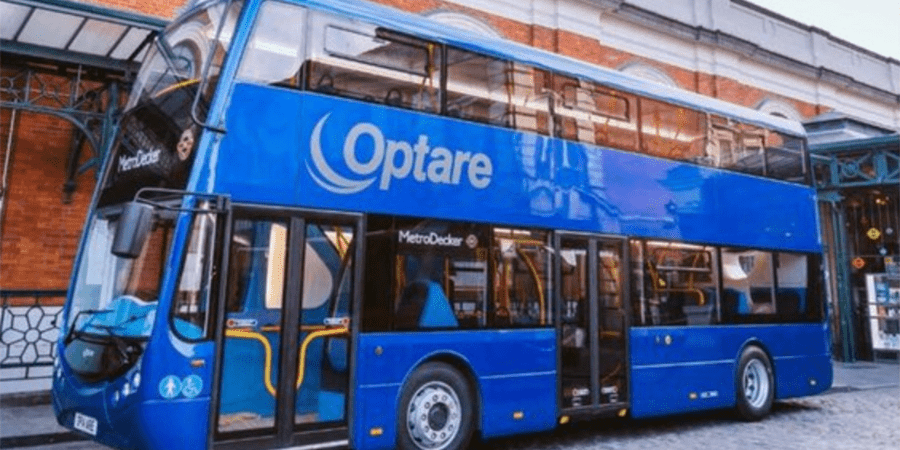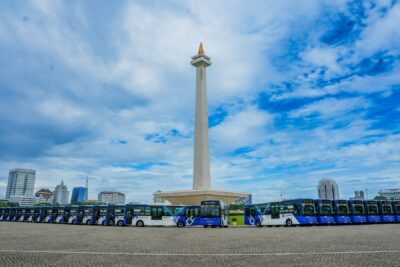Optare launches H2 fuel cell double-decker bus
Optare, the English subsidiary of India’s commercial vehicle manufacturer Ashok Leyland, is launching a fuel cell double-decker bus in cooperation with Arcola Energy. The first Optare Metrodecker H2 buses are already scheduled to go into service in 2021.
The Metrodecker H2 is based on Optare’s BEV platform, seats more than 90 passengers and, according to the manufacturer, has a range of between 200 and 250 miles (320 to 400 kilometres). Optare has not yet provided further technical data about the buses – such as the performance of the fuel cell, the size of the buffer battery and the capacity and installation location of the H2 tanks. The vehicle largely corresponds to the battery-electric double-decker, but instead of the battery pack, it contains a fuel cell package specially developed by Arcola Energy for this installation space.
Arcola Energy will build the fuel cell system at its Liverpool plant, but the company is planning a second production facility at Michelin Scotland Innovation Parc in Dundee. The vehicles themselves will be assembled on the same line by Optare in Leeds together with the Metrodecker EV.
“The innovative structural design of Optare buses makes them ideally suited for housing zero-emission power trains,” says Ben Todd, CEO of Arcola Energy. He sees the partnership as an essential step forward, “not only for Arcola Energy but also for the deployment of hydrogen fuel cell vehicles in the UK”.
The topic of fuel cell buses is a hot one. Just yesterday in our daily newsletter, we quoted JCB heir Jo Bamford (owner of Wrightbus) in a report from NewMobility regarding his plans for a UK-built, 3,000-strong hydrogen bus fleet across the UK. He said: “The UK missed the opportunity to become global leaders in battery technology, we must not repeat this mistake with hydrogen.” Bamford further extrapolated that the UK is “already leading the world by making hydrogen buses and boilers. We have a real opportunity to back a sector that will create jobs, economic growth and allow us to claim the position as global leaders in hydrogen transport technology.”
Although Bamford was right that developments are moving well for the United Kingdom in fuel cell bus options (especially with his recently acquired company Wrightbus that already has fuel cell double-decker buses on the market), other bus makers have also caught this bus: Market leaders here are Polish bus maker Solaris, who has just sold 20 of its Urbino 12 hydrogen buses in the Netherlands and even further ahead is the Belgian bus maker Van Hool who launched the award-winning Exqui.City 18 FC last year. Van Hool is already providing large orders with the A330 fuel cell buses, with which it is also both the European and North American markets.
The very slowest to market so far is Daimler Trucks and Buses who recently planned a joint venture with Volvo to develop fuel cell systems, but who have failed to bring several fuel cell bus prototypes to market although these have been around since at least 2009. The failure here, as Bamford observed, was the case in England, was already to be very late with the battery-electric bus. Germany looks like it is still making the same mistake with fuel cell buses. New to this arena is New York-based company Hyzon Motors, who said this month that it had received a Memorandum of Understanding order for 1,000 hydrogen fuel cell buses from an unnamed client.
In Optare’s case, the UK company with Indian roots is already thinking of the bigger picture. The new fuel cell buses are not only to be offered in the UK but also (as left-hand drive vehicles) internationally (this includes Japan, South Africa, Australia, the Caribbean and India, among others). Optare sees a market in countries with high ambient temperatures: fuel cells are better suited than batteries if a permanently high performance of the air conditioning system is required.
airqualitynews.com, h2-view.com, sustainable-bus.com, optare.com





0 Comments